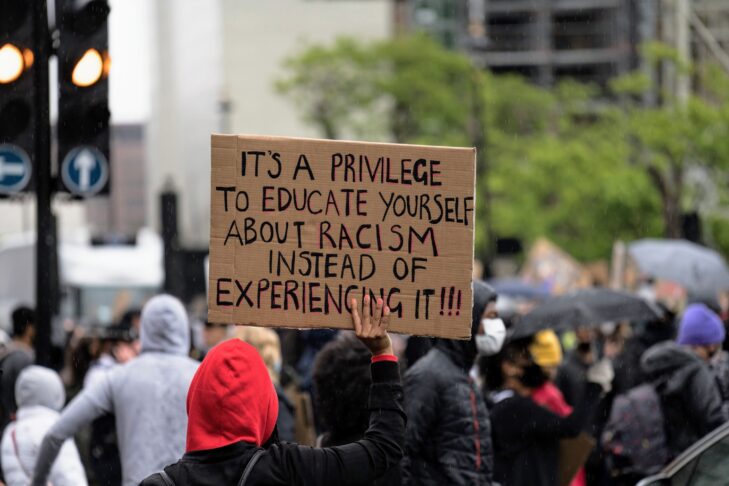I don’t have that much to add to the conversation right now. Yet, here I am. Writing to you because I want to hold you all close and help you process but I don’t quite have the time to do that for every single one of you, so instead I’ll do what I can here.
At this point, there have been plenty of blog posts and Twitter threads and Instagram captions for you to read. You’ve purchased a book or two from a black-owned bookshop, which is on back order because everyone else had the same idea. Maybe you posted a black square, maybe you didn’t. Maybe you’ve been to marches before the last few weeks, maybe you are recently joining Black Lives Matter protests for the first time. You may feel overwhelmed and sad and angry and all the things. And you’re seeing your students post, write, tweet and march. And maybe you’re asking: Wait, how am I supposed to show up for them in their process when I am in my own?
I’m not an expert in this by any stretch, but what I can say is that I’ve spent a lot of time over the past decade or so asking myself how I show up as a white Mizrahi educator in the world of Jewish community, and how my role as a teacher of young people interacts with my own racial identity. Also, please note that this is not a checklist of things I have completed and am now on some higher plane of existence doing amazing things all the time. I messed up two weeks ago on some of this stuff. It’s just a list of things that I think can help us, right now, do some good, hard, difficult work, while we have the summer ahead with no camps or classes and LOTS of time on our hands. A list for you, because as my friend B says, “White people love lists.”
Stop for a second: White supremacy culture wants us to be perfect, wants us to do it all right now and thinks we are the ones who have to do it. We have to run the panel, we have to teach the lesson, we have to lead the book club. As a matter of fact, we don’t. Take some time to breathe, to learn, to be present and to make a plan of action for how you are doing to do the work. Prepare to mess up and find ways to hold yourself accountable.
Do the work to understand your own internalized anti-black racism: “But I’m not racist!” is something we’ve (hopefully) communally left in the past as we come to understand that racism and white supremacy are the “water we swim in.” Now it’s time to not only seek anti-racist education, but to understand that we are inherently part of a system of anti-blackness. Tip: Don’t do this alone. Find another educator and/or white buddy to work through this with. It is devastatingly hard work. Oh, and also? It’s never-ending.
Stop calling yourself an ally, maybe: “Ally” is a verb, not a noun. It is not a self-proclaimed identity that we get to label ourselves with. Read what Roxane Gay said about allies here. Think about how you want to show up in the movement, in your communities, in your classrooms. Be that person, and don’t focus on telling people that you are that person.
Read, then watch, then read some more: We’re the people of the book. There are hundreds of lists of black authors to read. Read them! Also? Add Audre Lorde to the list. And James Baldwin. Right now I’m on “Are Prisons Obsolete?” by Angela Davis. Read Michael Twitty. Watch Ilana Kaufman’s ELI Talk. Follow the work of Yavilah McCoy. Follow Reuben Telushkin on Twitter. And Ericka Hart on Instagram. Alma even pulled together—you guessed it—a list of black Jewish authors you can read. Get comfortable in discomfort when you read things you don’t agree with. Look up the historical contexts for social movements. Consume (and pay for) black art—but not in a place that’s designed for BIPOC.
Either yourself, or your institution, spend the time and resources to hire coaches, trainers and consultants from Jews in All Hues or Dimensions Educational Consulting, the two longest-running independent organizations run by black Jews and Jews of color. And pay them what their fee is because this work is more than a job; it’s emotional labor. Do it now, do it in the future, do it forever. Because the work is never done.
This is just a handful of things. There are a million things we can and need to do every day. It can feel overwhelming, but as we know, the work is hard, and we are not free to desist.
This post has been contributed by a third party. The opinions, facts and any media content are presented solely by the author, and JewishBoston assumes no responsibility for them. Want to add your voice to the conversation? Publish your own post here. MORE



